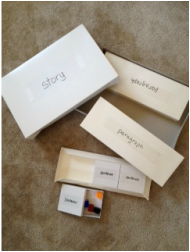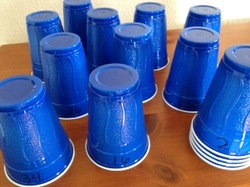
- On the biggest box I wrote STORY
- On two boxes inside this I wrote PARAGRAPH
- On three boxes inside each of these I wrote SENTENCE
- Inside these I placed colored unifix cubes to represent words. Unifix cubes, usually used as a math manipulative, are wonderful for building sentences because you can color code the words by part of speech.
- Inside the Unifix cubes I placed tiny alphabet beads that spelled words.
All eyes were on the boxes as we slowly unpacked the concept! The students really grasped the idea that each 'thing' was a part of a bigger thing, and that each whole had smaller parts.
My boxes will be easy to wipe off and use again for another concept in the future.

 RSS Feed
RSS Feed